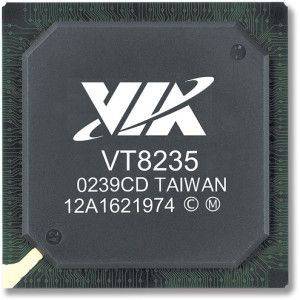From our front-page news:
In a somewhat surprising move, Richard Brown, VIA's VP of Corporate Marketing in Taiwan, told Custom PC that the company would be leaving the motherboard chipset business in order to focus on more important products, such as their Nano processor (which, as we've seen, is a serious competitor to Intel's Atom).
Brown went on to say that the reason VIA moved into the x86 processor scheme of things to begin with is because they believed the third party chipset market would disappear, and that they'd need the capability to provide a complete platform. Fair enough. But I'm sure it also doesn't help that AMD, Intel and NVIDIA are all offering great chipsets right now, and are more capable of pumping cash into constant development.
Regardless of this decision, VIA's processors are on the up, as we've seen before. The Nano is seriously competitive with Intel's Atom, so it makes all the sense in the world to shift more focus there and become even more so. Oh well, VIA will forever remain in my heart for providing a great chipset on my old MSI KT4-V Socket A board. Wasn't great for overclocking, but was incredibly stable otherwise.

VIA's previously had a rocky relationship with Intel over its third-party chipsets. Back in 2001, VIA released the Apollo P4X266 chipset, which brought DDR memory support to the Pentium 4, despite not having a license from Intel. To avoid the wrath of Intel, motherboard makers produced boards based on the chipset using VIA’s name rather than their own brands.
Source: Custom PC
Brown went on to say that the reason VIA moved into the x86 processor scheme of things to begin with is because they believed the third party chipset market would disappear, and that they'd need the capability to provide a complete platform. Fair enough. But I'm sure it also doesn't help that AMD, Intel and NVIDIA are all offering great chipsets right now, and are more capable of pumping cash into constant development.
Regardless of this decision, VIA's processors are on the up, as we've seen before. The Nano is seriously competitive with Intel's Atom, so it makes all the sense in the world to shift more focus there and become even more so. Oh well, VIA will forever remain in my heart for providing a great chipset on my old MSI KT4-V Socket A board. Wasn't great for overclocking, but was incredibly stable otherwise.

VIA's previously had a rocky relationship with Intel over its third-party chipsets. Back in 2001, VIA released the Apollo P4X266 chipset, which brought DDR memory support to the Pentium 4, despite not having a license from Intel. To avoid the wrath of Intel, motherboard makers produced boards based on the chipset using VIA’s name rather than their own brands.
Source: Custom PC
